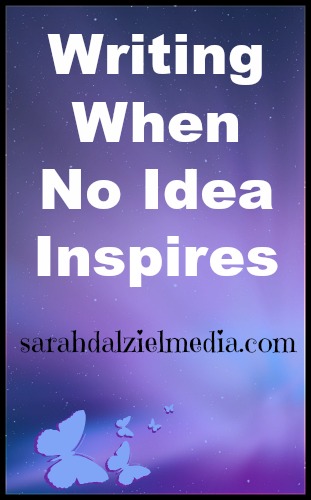Sometimes, writing is easy. The rest of the time, it feels like the most difficult thing you could possibly be doing. And, while brainstorming techniques can sometimes help, at other times even those fail to provide any motivation to put words on the page.
After writing at high speed, and focus, through November, when December hit I stopped writing. Sure, I’ve been blogging and writing non-fiction, but my fiction writing ground to a halt. I was also able to finish the print edit of The Prophet’s Shield last night, but today nothing creative came. Not even my pre-planned blog article was interesting enough to write.
What to Do When Nothing Sparks:
When your ideas are dull, your motivation’s tanked, and all you are doing is staring at the blinking cursor on the blank screen, writing is overwhelming. So, stop, get up, and take a break. Do something, anything, to get your mind completely off of writing. That could be the dishes, baking cookies, preparing a meal, or going for a walk. 
Inspiration is a lot like a spark. A single spark can start a forest fire, or a nice camp fire. When you can manage your inspiration, you have some creativity left at the end of the day and feel like you could keep creating. At this time, the inspiration is like a nice camp fire. It eats what you feed it, but it’s not consuming all your resources. If you push too hard, inspiration becomes like a forest fire. It consumes your mental resources, and leaves nothing for future creativeness.
Step One: Making Room for The Spark
Sometimes, if you have pushed too hard in creative endeavors for a time, it may be necessary to take a complete break. One day, or a week off from whatever project(s) are giving you the biggest blocks. Instead of writing, do something that lets you recharge. Go skiing or sledding, take a gander around a craft show, read a new book in your genre, or a new book in a different genre, watch a favorite movie series, in fact, do whatever makes you feel the most excited about right now.
Step Two: Laying the Foundation for The Spark
If you are writing, whether it is a story, a school paper, a novel, or a blog, you had some reason for starting it. Take a bit, and revisit the “why” behind your writing goals. A paper for school’s why may be “to get good grades” or “because I spent over a thousand bucks on this course.” For a novel, it may be to get the story out because you’re the only one who can tell your story.
Realistically, every “why” will be different. But, it is your why that lays the foundation for your inspiration’s fire. Your “why” is your initial fuel, the base from which the tiniest spark of inspiration can grow and influence your writing.
Step Three: Rekindling the Spark
For a novel, story, or even university paper, the best way to rekindle one’s creativity around it is to read what you have already written. Get yourself back into the story, or the research, or whatever you were working with. Then, when you get to that dreaded page, where the blank screen stares at you and the cursor blinks balefully in your direction, you can place your hands on the keyboard and start adding. Once you have read what you have, hopefully you have re-caught the fire and direction you had when first beginning this work and will be ready to type off into as-yet un-written territories.
Inspiration, Goals, and This Time of Year:
There is but half a month left until 2015 is over. Some of you may be thinking of unsuccessful New Year’s Resolutions from last year, whiles others may be making new resolutions for this coming year. Resolutions are a lot like inspiration. They burn brightly for a short time, but soon dim out if they are not tended to as a goal, with a “why” that you can refer back to for motivation.
I admit that I only made one of my goals that I set last December. One of my other goals I half met, while two others I also roughly half succeeded on. All three of these “half met” goals are re-entering the “goal list” this year, as well as several new goals and challenges. Personally, I prefer short term goals. I can sustain anything for one month, and it is fun to change goals or approaches on a month by month bases. It keeps things interesting, and as a creative I like interesting!
I have found that New Year’s Resolutions are a lot like the muses, fickle and really hard to keep around, but a good plan, solid goals, and a strong “why” help.
Back To You:
If you found this insightful, leave a comment. I enjoy hearing from you!

Leave a Reply